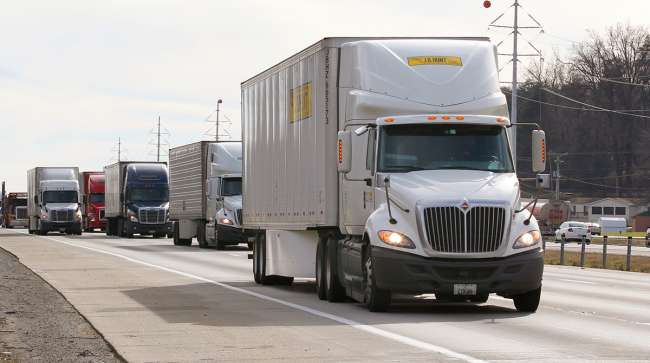Senior Reporter
J.B. Hunt Reports Mixed 2Q Results

[Stay on top of transportation news: Get TTNews in your inbox.]
J.B. Hunt Transport Services Inc. reported net income fell and revenue increased in the second quarter amid mixed results in its business units.
Net income for the period ended June 30 was $133.6 million, or $1.23 per diluted share compared with $151.7 million, or $1.37 in the same period the previous year.
Operating income dropped 10% to $193.1 million compared with $214.8 million a year earlier.
Total operating revenue climbed to $2.26 billion, compared with $2.14 billion a year earlier.
J.B. Hunt CEO John Roberts said that over the past couple of months it has taken longer to close deals, calling the environment a little tepid.

“Seems like everybody’s trying to figure out what’s going on with the economy. But we’re still on our target plan for this year, feel very good about that. And the demand is still very high for pure dedicated business,” Roberts said.
The 6% growth in total operating revenue was due primarily to a 19% increase in revenue-producing trucks and an 8% increase in truck productivity in its Dedicated Contract Services unit.
That was partially offset by an 8% decline in volume in its Intermodal business, a 7% decline in volume in its Integrated Capacity Solutions unit and fewer tractors operating in its Truck division compared with the prior year, according to the Lowell, Ark., company.
The amount of operating revenue in the Integrated Capacity Solutions unit executed through Marketplace for J.B. Hunt 360° — its transportation management system where shippers can quote, book and ship freight online and carriers can find loads — increased to $222 million compared with $137 million in second-quarter 2018.
The Intermodal unit executed $41 million of third-party dray cost and the truck unit executed $5 million of its independent contractor costs through the platform during this quarter.
“Overall, we felt like there was some positives in an otherwise weak freight environment,” said Chief Financial Officer David Mee during an earnings conference call. “We saw our cost inflation becoming more normalized, and the bid season pricing is performing largely as we expected, though the range of pricing from beginning to end is wider than what we had originally anticipated.”
For the six months, the company had net income of $253.2 million, or $2.32, on total operating revenue of $4.35 billion. That compared with $269.8 million, or $2.44 the year before, on revenue of $4.09 billion.
The company is typically the first transport company to report quarterly earnings, Cowen Inc. analyst Jason Seidl wrote in a note, adding that Hunt provides “read-throughs for other companies across transports.”
Seidl wrote the revenue gains and earnings before interest and taxes beat expectations in the dedicated trucking segment, “augmented by positive commentary concerning this division on the conference call, is a positive sign for other companies with dedicated operations.”
He noted that for the second consecutive quarter revenue for the Trucking, Intermodal and Integrated Capacity Solutions divisions fell short of consensus estimates.
During the conference call, Nick Hobbs, president of Hunt’s Dedicated unit, explained that most of the rate increases for dedicated shipments were locked in.
“I would just say that in our business, 68% to 70% of our revenue has some type of index, or built-in rate increases, in the contract, and it just happens automatically. And so we’re not in the quasi-dedicated business. And so we’re anywhere from 2% to 4%, but it’s consistent year in and year out,” Hobbs said.
J.B. Hunt Transport Services Inc. ranks No. 4 on the Transport Topics Top 100 list of the largest for-hire carriers in North America. It also ranks No. 4 on the TT list of the 50 largest logistics companies in North America.




